- Home
- Cynthia Ozick
Antiquities Page 5
Antiquities Read online
Page 5
Yet his table held a panoply of perplexing items: a drawstring sack of some fine material, silk or satin, and next to it a pair of small black cubes, or were they boxes, attached to what appeared to be twin leather leashes, rather like a pony’s reins. And lying open beside this eerie contraption, a distinctly foreign-looking book. Its blackened corners were frayed, and an unknown odor drifted faintly from it, like the smell, I imagined, of some forest fungus. I saw that its letters were unrecognizable, and asked whether he could actually read such ugly blotches, and what language was that? He said nothing at first, as if deciding whether to answer, and then shut the book and opened the drawer of his table and carefully deposited it there, meanwhile maneuvering the contraption with its curly reins into its sack before positioning this too, again delicately, into that same hidden place. It is very old, this language, he said finally, and I must now apologize to you. You could not know, he said, how could you know, no one ever knows, they suppose this and that, or they think I speak foolishness, and why should I have expected that you, unlike all others, would understand? His voice shook, and also his hands. Perhaps, he said, it is that I believed you to be my friend, and now I am ashamed. I am your friend, I said, and was all at once frightened by my own words, as if I might really be speaking truth. To be the friend of a grotesquerie (this fearsome term comes to me only now) seemed far more dangerous than the boyish pariahship that was already my plight. The peril worsened: he slid off his end of his bed and pulled me down beside him, with his face so close to mine that I could almost see my eyes in the black mirror of his own. I had never before felt the heat of his meager flesh; sitting side by side in the chapel’s confining pews, our shoulders in their Academy blazers had never so much as grazed—nor had our knees in our short trousers. And now, the two of us prone on the floor among the nubbles of dust, breathing their spores, I seemed to be breathing his breath. Our bare legs in the twist of my fall had somehow become entangled, and it was as if my skin, or his own, might at any moment catch fire. He spoke with a rhythmic rapidity, almost as if he were reciting, half by rote, some time-encrusted liturgical saga. It had no beginning, it promised no end, it was all fantastical middle, a hallucinatory mixture of languages and implausible histories. And what was I, pressed body to body, to make of it?
The attentive reader (if by now such reader there be) is my witness; only see how I have too long put off the telling of it, and how can I tell it even now, when in fulfillment of my memoir I must? Can I reach out my fingers to capture a cloud, a vapor, an odor? Then do not think that I own the power to replicate any graspable representation of what came to pass that afternoon in my tenth year, when the shouts from the football field were themselves no more than some distant ghostly abrasion. Nevertheless, insofar as my feeble understanding under these circumstances will permit, I will attempt to extract from Ben-Zion Elefantin’s untamed babblings a semblance of human coherence. As I say, I must try. But no, it cannot be done; not by me, and who else is there? No other person on earth, and this damnable tremor begins to rock my wrists, my fatigue defeats me, the keys of my Remington are no better than boulders, I fear a panic will soon overtake me if I do not stop, and here thank God is Hedda with the supper tray thank God thank God thank God
* * *
—
3:30 am
Sleep has eluded me for many hours, so deep is my abashment. To have lost self-possession, and to such a degree, in the presence of the kitchen help! And that Hedda should have seen me so disheveled, with my shirt collar wet, and these shaming infantile tears, how am I different from that forsaken miscreant whom in my private mind I call the Childish One? What is it to me that he mourns his misbegotten accomplice? And what is it Hedda must think? Two old men weeping, two old men grieving? I myself hardly know why I grieve, and for whom? For my unhappy boyhood, for my sweet Peg, for my unlucky and frivolous son? And to find me so undone, and yet to have come with her own lament! Two of the staff have departed, she told me, without a word of warning, and how was she to cope, she and that slattern Amelia, das Flittchen, only the two of them, diese Schlümpfe lazy and useless, left in charge of six broken old men, each more zerbrechlich than the next, the frailest of all starving himself night and day on his dirty sofa with his head down, refusing to eat a crumb of bread or sip a drop of tea, a sick man who ought to be in the hospital? And who was to get him there? Did he have a wife, a daughter, a son? What was she to do with him? What was I, in my capacity as Trustee, to do with him, has he no family, no friend, no heir?
I replied that I would review the Charter of the Trust to determine a suitable course, and then, unable to look her in the eye, I dismissed her.
* * *
*
July 22, 1949. Further to the Charter. The original, of course, is in the Academy vault at J. P. Morgan, but I retain a copy here in my study, where I keep it together with my personal volume of the History, though I have rarely consulted it since the establishment of Temple House, when additional clauses were necessarily incorporated. And indeed there is provision for such a contingency as care for the seriously moribund, the funding for which to come under the bank’s jurisdiction. Setting all this in motion, alas, falls to me. It cannot escape my judgment that this childless miscreant’s predicament is no better than that of a vagrant found dying in the street; yet I who have a son, will my own fate differ when I too inevitably succumb?
It has now been several weeks, in fact I count two months, since I have had any word from my son. In light of the length of this period of silence, I will confess to having broken a wary and unacknowledged vow (unacknowledged by him, wary on my side). I mean by this that rather than wait for his own action in this respect, I undertook to telephone him, in part because I believe his resources are, as usual, low, and in the hope of sparing him the expense of a long-distance call. The result was unfortunate, and I am largely, if unintentionally, to blame. Though I have not spoken of it outright, I presume it is fully evident that given my retirement, and with no further Petrie to carry the firm on into the future (my son having preferred a less onerous path), the venerable Petrie partnership is now lamentably defunct. On this occasion, despite my long-held familiarity with time-zone vagaries—a mere one-hour difference from Chicago, three from Los Angeles, and what law office can function without such instinctive knowledge—my memory abandoned me and caused an unforgivable intrusion: I reached my son in the middle of his California night. He was, I admit, startled, and reminded me that this unexpected disruption was not my first such malfeasance; it had happened twice before. I felt constrained to apologize, which only brought on a kind of confusion, or rather anger, on his part: he explained that he and a collaborator were working through the night on content (his strange jargon) which may have already interested a producer. I believe this is what he told me. Or was it that the producer was at that very moment at his side? Certainly he was not alone; I heard what I took to be a nearby voice, a murmur that was kin to laughter.
These increasing forgettings greatly distress me, and perhaps the ingenious inventors of our modern era, who have already brought us the television sets that are beginning to proliferate even beyond the barroom, will one day devise a telephone that allows one to know the identity of the caller before responding. Such a development would surely inhibit my son’s growing coolness, and my embarrassment at discovering him in flagrante delicto.
* * *
*
July 25, 1949. What has become of me? Excess emotion has made me shameless, and my tongue (I mean my prose) is paralyzed by coarse legalisms. A memoir ought not to be a deposition, and how I wish it were, with all its conciseness and clarity. Instead, I write, indeed I speak, in turbulence, captive of these helpless tears that terrify me, as if I am already blundering in the haze and corrosions of a dying brain. Was it some crackpot seizure of dream and dementia that took hold of me four days ago when I could not summon Ben-Zion Elefantin’s deposition, if that is
what he meant it to be, his pleading a case for his curious existence, his pitiful defense? How can I find my way out of this wilderness of hesitation? Or dare I say shame?
* * *
—
5:21 am. Dawn. My wrists, my very ribs, ache from the keys. Longhand no better. A spilled vessel. Drowned. As if strangled by trance. The voice is not mine. Then whose? And how?
* * *
*
July 26, 1949. Here I must explain a change I am introducing in the organization of the admittedly chaotic document presently under my hand. It will be recalled that as these pages accumulated, I at one time stored them in a rectangular box (it once sheltered my father’s substantial Cuban cigars) with an ornamental lid, the lid to serve as a warning to trespassers. But the growing length of my memoir can no longer be contained in so shallow a receptacle, and in any event I no longer fear a recurrence of vandalism: the vandal is dead. (Sans gravestone, it pleases me to say. Through Hedda I learn that the nonagenarian’s younger brother, himself a fading octogenarian, has disposed of the ashes in some obscure upstate waterway.) Hence I am free now to allow these increasing pages to build as they will, open to sight and secured by a cherished paperweight: my grandfather’s antiquated brass notary seal. The vacant box will henceforth have another use. I intend to sequester therein a certain portion of this manuscript, i.e., what I can only describe as my attempt to transcribe the tenor of Ben-Zion Elefantin’s utterances. Not, let it be understood, that they have faded over the last seven or more decades. On the contrary: they remain for me akin to a burning bush, unquenchable. I will determine later whether I judge this putative transcription to be suitable or worthy (I mean comprehensible). If not, and it is the crux of my memoir, then all that I have set down so far will be null and void. But even if it should have a certain validity, ought it to be preserved? Or does it demand to be hidden, lest it expose an already broken being, one whom I once loved (while unaware of that love) and whose whereabouts today I do not know?
* * *
*
[Note: concealed herein are the papers in question. As of this writing, August 2, 1949, they will so remain until their disposition is determined, which determination will itself depend on the trustworthiness of the contents.]
* * *
—
You asked how I came here to the Academy. My uncle brought me. In every city where my parents are obliged to leave me, there is always an uncle to choose a school for me, yet not one of them is truly an uncle. How my present uncle happened on this place, it is impossible to surmise. It may be that he was impressed by what he took to be a congenial name, and believed that my parents might be pleased by it. My father and mother are transients and travelers, with no settled home, they are buyers and sellers, they are seekers and doubters, and they live mainly in hotels. Some of these hotels are pleasant, most are not, but rather than being shut up in a school, I always prefer those indifferent rooms where we never stay long and I am never expected to explain who I am, or pressed to find a friend my own age. When I was much younger, I pleaded to be taken wherever they might go, and promised that I would never complain of the heat or cry if I hated the food, and would never be sick, and would always be good. But they told me there were too many dangers for a child in those Levantine regions of constant upheaval where their particular business led them. To calm me, they explained as simply as they could that though they held themselves out to be ordinary traders, they were in truth pilgrims in search of a certain relic of our heritage, and that this was the primary hope of their work. Somewhere, I came to understand, lying unrecognized in one of the thousand alleyways and souks in the village markets of Egypt, or Palestine, or Syria, or Iraq, this significant thing, whatever it was, could be uncovered.
And when I asked why it was significant, they assured me that one day, when I was older, I would see for myself, and meanwhile, until it was found, they must earn our bread. This, they said, was the reason for their peregrinations: it was for the sake of foreign objects, exceedingly ancient, that persons in the West coveted and might wish to buy. And when I asked why these objects were coveted, my father replied It is for the vanity of the coveters, and my mother said It is because they are hollow and have no histories of their own. This was the cause of our having come to New York, where there are many such buyers. Our hotel in this city was too small and too cramped and too noisy, near streets made too bright in the middle of the night and crowds swimming like fishes all around, but still I would be more content to be left in such an unsavory scene than confined here where there are grasses and trees and schoolbooks without interest or weight, and where Scripture, the story of my people, is derided and whistled at by unlettered boys. My parents are not to blame, they must leave me behind to purchase their wares from fellahin who scratch with their hoes among the stones of the field, or from hawkers who crook their fingers under the shadowy arches of defeated cities. And soon an uncle will come to take me away to another hotel in another country, where a different uncle will accompany me to another school.
What my parents promised has come to pass. Though the significant thing has yet to be discovered, I have by now seen for myself who we are. My family name reveals our origins, which for reasons of rivalry and obfuscation have been omitted from the Books of the Jews, where it ought by historic rights to have been set within the chronicles of the Israelites. Never mind that there are in our own language missives attesting to our presence—we Elefantins remain outcasts from the history of our people. They say of us that because of our far-flung island home we were without knowledge of the breadth of the imperatives of Moshe our Teacher, whom we revered, and followed into the wilderness. As if we are not ourselves Israelites, as if we too did not stand at Sinai among the multitudes of the Exodus! If it is true that we have been erased from Torah, it is because we are victims of falsifying scholars, betrayers who have become our interpreters. They have written of us as servile mercenaries, willing sentries for the haughty Persians who overran Egypt and commanded a fort to fend off yet other invaders—but are they not themselves mercenaries in the pay of the lies of the scholars? We, the Elefantins, hold our own truths. Our traditions and practices are far weightier than the speculations of those ignorant excavators, those papyrologists who pollute our ruined haven with their inventions and prevarications. Of our truth they make legends. Hirelings on behalf of the Persian conquerors of Egypt we never were! With our generations of loam-red hair, Nubians and Egyptians we are not. Rather we are what our memories tell us, lost stragglers, dissenters who became separated in the wilderness from that mixed throng of snivelers after the fleshpots of our persecutors. We alone were unyieldingly faithful to Moshe our Teacher, we alone never succumbed to their foolish obeisance to a gilded bovine of the barnyard. Willingly we parted from them, and blundered our way we knew not where, and in the scalding winds of the desert hardly discerned north from south, or east from west. In the innocent blindness of our flight we turned back to an Egypt ruled now not by pharaohs but by foreign overlords, a green island inhabited by idolators who there had built a temple to Khnum, a fantastical god of the Nile in the ludicrous shape of a ram, and yet another god with the limbs of a man and the head of a stork, and still other gods of the river, red-legged storks that they mummified to preserve their divinity. And for their rites and libations they fashioned slender vessels made in the image of storks. All the gods of the nations are ludicrous, and all are fantastical, all but the Creator of All who created all the suns and their planets, and all the rivers and seas of the earth. And because we had no fear of the imaginings they called their gods, who for lack of existence could not have ordered the fullness and withdrawal of the Nile, we built, very near to their fraudulent shrine, our Temple to the Creator of All. It was in this way that we came as true Israelites to Elephantine.
These were the beliefs and writings and precepts of the heritage I received from my father and my mother, who had received the very same fr
om their predecessors, as they in turn had received them from our distant progenitors who raised up the Temple at Elephantine. Since then, we have been as a people scattered and few, and worse: forgotten, as if we never were. We live on as if in hiding. Even when our Temple stood, how humble it was, and how it disdained grandeur! It was built low to the earth, and constructed of earth, with a modest courtyard and fine tiles on its floor, and never a pillar blooming with crests of stone flora. We were, after all, stragglers. It was not our fate to go up to Jerusalem, or to set eyes on the stream that is called Jordan. Our companionate river was the Nile, once divinely bloodied so that we as a wretched people could escape our condition as slaves. It was through our proximity to the watery site of these memories that the Passover remains precious to us—and still we are expelled from the Books of the Jews!
And then, in a turn of our fortune, it was revealed to us by certain travelers that on a summit in the town of Jerusalem there was still another Temple, this one very grand, and peopled by Priests and Levites, to whom letters were sent, and from whom letters arrived. They too spoke and wrote our language, as who among the nations did not? In their inquiries we saw that though we may have been acknowledged as fellow Israelites, we were also regarded as improbable curiosities: they wished to know how we lived, how our families and neighbors were constituted, what our usages were, what plants and beasts and fowl there were on our island, and much else. We told them of the rich moisture of our reddish clay, how sheep and cattle were few while birds were many, especially the storks that thrived in colonies in the shallows of the Nile; and at first they made no murmurings against our Temple. And little by little, as we informed them of our beginnings and our ways, we learned theirs: the history of how their Temple was ruined, and how they were exiled to Babylon, and how they returned to rebuild it, all under the rule of the very Persians for whom we were supposedly abject hirelings! They told us of their commandments and ordinances, written in the books we stragglers did not possess, they told us of the Book of their teachers Ezra and Nehemiah, and their Book of holy instructions called Dvarim. And according to the wisdom of these books, they believed that only their Temple on the heights of Jerusalem permitted worship of the Creator of All, and that all other sanctums were forbidden, inclined as they were to the ludicrous and fantastical gods of the nations, and to false icons of gold and licentious figurines. And so it was according to the wisdom of these books that our riverine Temple, so contagiously close to the delusionary shrine of Khnum, was soon deemed illicit. But was not our Temple, like theirs, adorned by a seven-branched menorah, and a shulchan for the shewbread, and did not our kohanim, like theirs, honor the rites of sacrifice, were not birds brought by our people as burnt-offerings, all the birds that were pure, and none, like the stork, that were not? And was not our Temple also razed by enemies, our neighbors the priests of Khnum, who hated us because we doubted their gods? And were we too not exiled from our soil and compelled to sojourn elsewhere? We who revered Moshe our Teacher and faithfully followed him into the wilderness and never made obeisance to a gilded bovine of the barnyard!

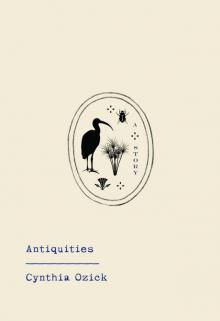 Antiquities
Antiquities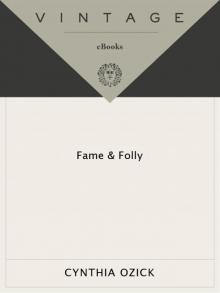 Fame & Folly
Fame & Folly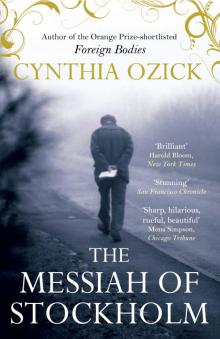 The Messiah of Stockholm
The Messiah of Stockholm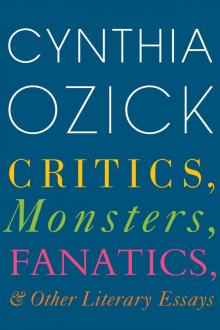 Critics, Monsters, Fanatics, and Other Literary Essays
Critics, Monsters, Fanatics, and Other Literary Essays Heir to the Glimmering World
Heir to the Glimmering World The Din in the Head
The Din in the Head Dictation
Dictation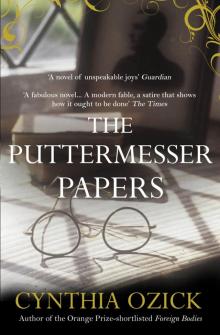 The Puttermesser Papers
The Puttermesser Papers Metaphor and Memory
Metaphor and Memory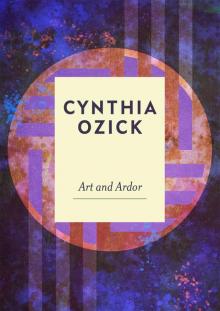 Art and Ardor
Art and Ardor Foreign Bodies
Foreign Bodies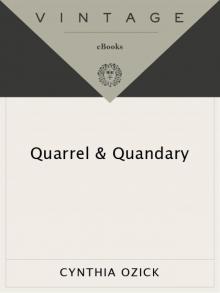 Quarrel & Quandary
Quarrel & Quandary